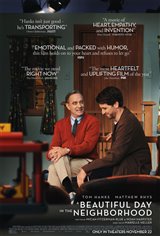
A Beautiful Day in the Neighborhood
102 Reviews
| Write a Review
In Theaters: November 22, 2019
On DVD/Blu-ray: February 18, 2020
PG | Drama | 1h 47m
Fred Rogers
After high school, Rogers studied at Dartmouth College for a year before he transferred to Rollins College in Winter Park, Florida where he earned his degree in music composition in 1951. During his senior year of college, he frequently visited his parents and was awed by their new television set, imagining a brilliant future for TV and hoping to be part of it someday.
Upon graduating, Rogers was hired by NBC television in New York as a floor director for The Voice of Firestone. Later, he became floor director for three shows: The Lucky Strike Hit Parade, The Kate Smith Hour and The NBC Opera Theatre.
In 1953, Rogers moved back to Pennsylvania to be part of WQED Pittsburg – the nation’s first community-sponsored educational television station. He was asked to develop the first program schedule. He came up with The Children's Corner, a daily, hour-long program that allowed him to incorporate his love of puppetry and music. In 1955, The Children's Corner was awarded the Sylvania Award for best locally produced children’s program in the country.
When he wasn't working, Rogers attended both the Pittsburgh Theological Seminary and the University of Pittsburgh’s Graduate School of Child Development. He graduated from the Seminary and was ordained as a Presbyterian minister in 1963. Later that year, he was asked to develop a children’s program for the CBC network in Canada. He created MisteRogers, on which he made his debut as a television host.
After six years on the show, in 1966, Rogers, his wife Joanne, and their two sons returned to Pittsburgh, where he developed MisteRogers into Mister Rogers’ Neighborhood, his highly successful show that ran from 1968 until 2001. Throughout the years, the show stayed true to its respect for its young audiences and its coverage of issues children faced, that were rarely covered by other kids’ programs.
Rogers appeared as the show’s producer, host and head puppeteer and also wrote the program’s scripts and songs. He won several awards during the show’s run, including four Daytime Emmys, a Lifetime Achievement award in 1997 and the Presidential Medal of Freedom. In 1999, he was inducted into the Television Hall of Fame.
Outside of his television show, Rogers remained committed to children and served as a chairman of a White House forum on child development and the mass media in 1968. He was often consulted as an expert or witness on such issues.
Rogers passed away on February 27, 2003 after a year-long battle with stomach cancer. He died at his home in Pittsburgh with his wife Joanne at his side. His legacy lives on through his non-profit company Family Communications, which was later renamed The Fred Rogers Company in his honor.
The award-winning documentary film Won't You Be My Neighbor? (2018), which depicts Rogers' life and career on and off television, released in June 2018. The following year, Tom Hanks starred in a movie about Mr. Rogers, titled A Beautiful Day in the Neighborhood (2019).
